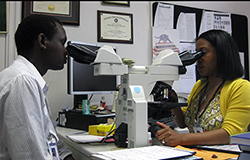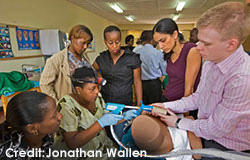

Enriching His Homeland's Resources
Screening for HIV-Related Cancers in Rwanda
Gad Murenzi's dream of becoming a medical doctor was nearly derailed when the ambitious high school student was offered a scholarship to study agriculture in Egypt.
Instead, he attended medical school in his native Rwanda and is now poised to help the small, East African country make dramatic strides in the area of public health.
As an Einstein research fellow in the department of pathology, Dr. Murenzi is training to improve screening methods and reduce the number of Rwandan women that die from HIV-related cancers.

Gad Murenzi, M.D. studying pathology with his mentor Tiffany Hebert, M.D."It's an opportunity to make an immediate impact," said the 28-year-old, who is training under the mentorship of Dr. Tiffany Hebert, assistant professor of pathology at Einstein, and attending pathologist and director of anatomic pathology education for the residency program at Montefiore Medical Center.
Receiving Vital Training
Since arriving at Einstein in February 2012, after working for one year at a police hospital in Kigali, Dr. Murenzi spends part of his days sitting with Dr. Hebert at a dual-headed microscope. He is learning to look at specimens and formulate a diagnosis, particularly of lower genital tract neoplasia and women's cancers related to HIV infection, such as cervical cancer. Dr. Murenzi will also gain exposure to other HIV-related malignancies including non-Hodgkins lymphoma. His new-found expertise is desperately needed in Rwanda, where pathology remains critically limited.
In fact, his native country is home to only two or three pathologists who service a population of nearly 12 million people, and neither of the specialists is a native of Rwanda.
"Many doctors don't know what pathology is," Dr. Murenzi said, noting that samples processed through the in-country system require an average of three weeks for results, with a number of samples lost in the process of transport and processing. "People either die or come in at really late stages, when the cancer has spread."
Addressing HIV
Risk factors, including multiple sexual partners and a high incidence of rape during the 1994 genocide, have produced a high rate of women living with HIV.
Still, no systematic screening and treatment program currently exists for cervical cancer, the most common malignancy among Rwandan women, or HPV, which women with HIV are at a greater risk of developing.
The Bronx, which has a high prevalence of HIV-infection, offers the perfect training ground for the young doctor.

Marc Sklar, M.D. speaks with trainees in a photo lab in Rwanda"He is getting to see things that would be comparable to Rwanda," said Dr. Hebert, who hopes to travel to Rwanda next year, after Dr. Murenzi returns home. "One challenge is training him on expensive equipment that he won't have access to in Rwanda."
The plan is to train Dr. Murenzi so he can do work with cervical cancers, and later be trained in full fledged pathology, perhaps in Nairobi or South Africa. He can then pay it forward to help train future pathologists in Rwanda.
"The idea is to fill a stop-gap so there's someone who can do that work with services," said Dr. Hebert, who completed her anatomic and clinical residency at Einstein-Montefiore, followed by a fellowship in cytology and subspecial training in gynecology pathology.
Benefits of Funding
Dr. Murenzi's opportunity was made possible by a generous NIH training grant under principal investigator Dr. Kathryn Anastos, professor of medicine and epidemiology & population health at Einstein, attending physician in medicine at Montefiore and co-director of Einstein's Global Health Center.
The grant, "Developing Rwandan Research Capacity in AIDS Malignancies," is part of a capacity-building effort to help the Rwandan government handle its own HIV-related malignancies and other non-communicable diseases.
"Rwanda will go from having one of the highest cervical cancer death rates in the world to having one of the lowest," said Dr. Anastos, whose community-based work in Rwanda has provided the first cervical cancer screening in the country. "Rwanda has developed one of the most successful HIV anti-retroviral treatment programs in the world."
As founder of Women's Equity in Access to Care and Treatment (WE-ACTx), a community-based organization devoted to developing high-quality ambulatory medical services for HIV-infected women in Rwanda, Dr. Anastos collaborates with the Rwandan government and non-governmental organizations to provide comprehensive HIV primary care, including antiretroviral therapy to women survivors of genocidal rape.
Her Rwanda activities resulted in the development of two community-based clinics that have brought 5,000 women, men and children into care, and an HIV-testing program that in three years tested over 48,000 people.
Establishing a Sound Foundation
The next step for the country's health plan is to train Rwandan doctors, nurses and pharmacists to provide comprehensive cervical cancer screening and prevention, and to maintain a national cancer registry, which until recently, did not exist. To date, cancer treatments have been limited to minimal chemotherapy and surgery. There are no radiation therapy facilities, although the country recently got its first MRI machine.

Einstein student Lukas Austin-Page assists during a PAP smear training while Lisa Nathan, M.D. (burgundy top) observesMeanwhile, in an effort to maximize his training, Dr. Murenzi will take a course in the Clinical Research Training Program (CRTP) and rotate in cytology under the guidance of Dr. Mark Suhrland, director of cytopathology at Montefiore, so he can better understand cervical screenings. He also will shadow Dr. Mark Einstein, director of clinical research for women's health and gynecologic oncology at Einstein and Montefiore, who is nationally known for his work in HIV-related disease and cervical dysplasia.
When he is not with Dr. Hebert at Montefiore's Weiler Hospital, Dr. Murenzi is busy attending grand rounds, didactic lectures, and gynecology tumor board meetings, which provide a wider context to see cancer cases.
Taking It Home
In January, Rwanda is expected to initiate its National Cervical Cancer Screening and Prevention Program in five hospitals throughout the country. Through Einstein's capacity-building grant, the College of Medicine will act as Rwanda's partner for program implementation in one reference hospital, which will be supervising 18 health centers that will serve as screening sites.
Einstein faculty, including Dr. Marc Sklar, clinical assistant professor of obstetrics & gynecology and women's health, will head to the East African nation to lead the training. In implementing the initiative's training and research, he will be joined by Rwandan physicians Drs. Jean Claude Dusingize and Jean D'Amour Sinayobye, who previously earned their master's degrees through Einstein's CRTP.
"During the first year, we anticipate that we will screen more than 600,000 Rwandan women, aged 35 to 45, for HPV, at five hospitals," said Dr. Anastos. "Any detected lesions will be treated immediately with cryotherapy, while more advanced cancers will be treated accordingly."
In addition, Dr. Murenzi's own springtime return to Rwanda will come at a pivotal time. "He becomes a very valuable resource to his homeland because of his training in cervical cancer and cervical pathology," said Dr. Anastos, while also noting that Dr. Hebert will be available to guide Dr. Murenzi in the event he encounters anything he's unsure of. "Gad's skills will be extremely important as new cases of cancer are identified through the screening program."
Dr. Murenzi looks forward to returning home to his wife and family while also helping move pathology in Rwanda forward.
"This is a life-changing experience," he said. "There's a lot of work to do."
Posted on: Tuesday, January 15, 2013

Tablet Blog